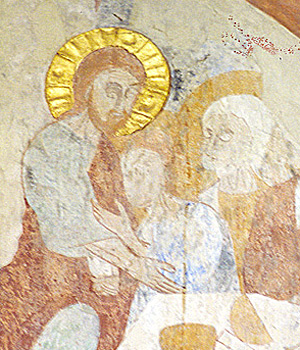| Det romanske kalkmaleri

| | Triumfvæggen der adskiller kirkeskib og kor rummer ofte i romansk tid kalkmalerier der har visualiseret de bibelske fortællinger.
Apsisbuen er som regel også bemalet og undertiden også dele af koret og skibets vægge.
Oplevelsen af selve kirkerummet og kalkmalerierne må have haft stor betydning for gudstjenesten. |
Den romanske kirke rummer som regel kalkmalerier, ofte er placeret på triumfvæggen, som adskiller skibet og koret og i apsisrundingen. F.eks. rummer Finja Kirke i Skåne på Triumfvæggen en stort anlagt skildring af dommedag, som også fortsætter på skibets vestvæg.
I Jørlunde kirke i Nordsjælland ses på Triumfvæggen en række forskellige motiver, i venstre side således øverst Lazarus opvækkelse og nederst brylluppet i Kana, begge scener fra Kristi manddomshistorie. Jørlunde kirke har tillige kalkmalerier på den øverste del af korets vægge og tilsammen udgør de et omfattende bibelsk billedprogram, der vel har understøttet forkyndelsen.
Triumfvæggen rummer også tit de såkaldte stifterbilleder, der skaber forbindelse imellem de jordiske givere og de højere magter: I Fjenneslev Kirke er stiftermotivet noget ublu sammenstillet med de hellige trekongers gavebud til Jesus-barnet.

Romansk grundplan | 
Finja kirke | 
Kristusscener | 
Tiumfbuen |
Rejsende værksteder
Fjenneslev Kirke er dekoreret af Finja-værkestedet fra Skåne, mens Jørlunde-værkstedet hovedsagelig har huseret i Nordsjælland og antages at have været tæt knyttet til Hvide-slægten, måske som håndværkere i deres brød.
Mens de langstrakte byzantinsk påvirkede afbildninger er karakteristiske for Finja-værkstedet er et af Jørlunde-værkstedets kendetegn anvendelse af stukarbejder i forbindelse med malerierne. Almindeligvis anskues det romanske kalkmaleri for noget stift og ubevægeligt, men hos Jørlunde-værkstedet ses også figurer med stor bevægelse og plasticitet.

Jørlunde Kirke |
Madonna-motivet
Madonnamotivet, som kendes i utallige variationer fra bøger og ikoner, optræder også i kalkmaleriet, således som dette eksempel fra et nichealter i Måløv Kirke, som er byzantinsk influeret, og måske med et håndskrift som forlæg. I Tveje Merløse Kirke findes et madonna billede nær ved kvindeindgangen, hen imod vestvæggen med stormandsgalleriet, som også rummer den eneste kendte bemaling på en vestvæg.

Madonnamotiv fra Målev | 
Tveje Merløse Madonna |
Majestas-motivet
Kirken og dens rum er et symbolsk mikrokosmos, hvor selve kirken betragtes som Kristi legeme og en del af hans rige og alteret f.eks. symboliserer Kristi grav. Kalkmalerierne er ligeledes omgivet med stor symbolik og det gælder i særdeleshed det dominerende motiv fra romansk tid, Majestas-motivet med den tronende Jesus som verdensherskeren.
Et fremragende eksempel herpå findes i Vä kirke, i det nordøstlige Skåne, som formodentlig har haft tæt tilknytning til kongemagten. Stilarten i Vä Kirke der er grundlagt omkring 1120, er tydeligvis italiensk-byzantinsk influeret og man antager at værkstedet har forbindelse til byggeriet af Lund domkirke. På korbuen i Vä Kirke findes også stifterbilleder sandsynligvis forestillende kong Niels og hans svenskfødte hustru Margrethe Fredkulla.
Centralmagtens ikon
Majestasmotivet tager udgangspunkt i et citat fra Davids salmer, som lyder således: "Himlen er min trone og jorden mine fødders skammel". Motivet finder oprindelig forlæg i østromerske kejserportrætter, hvor kejseren betragtedes som guddommelig. Kristus ses siddende på en himmelsk regnbue-trone i en mandelformet glorie (mandorla) omgivet af de fire evangeliesymboler: Markusløven, Lukasoksen, Johannesørnen og menneske-englen som symbol for Matthæus-evangeliet.
Motivet er typisk for den romanske stilart strengt geometrisk komponeret med himmelkongen omgivet af evangeliesymbolerne på en blå baggrund. Den blå farve var kostbar, udvundet af halvædelstenen lapis lazuli, der måtte importeres fra Italien eller Persien. Denne type af dekorationer har altså i sig selv været bekostelige og vidner om rigdom og offervilje hos bygherrerne.
I det hele taget er Majestas motivet fremherskende i Skåne og på Sjælland, sandsynligvis fordi det er knyttet til de kredse der forestod udviklingen af centralmagten: Kongen, Ærkebispen og repræsentanter for de betydelige stormandsslægter. Majestas-motivet er således også rigt repræsenteret på Midtsjælland, f.eks. i Hvideslægtens kirke i Tveje Merløse.

Majestas Domini i Vä | 
Majestas Domini | 
Majestas-motiv | 
Figurer |
|